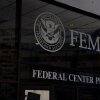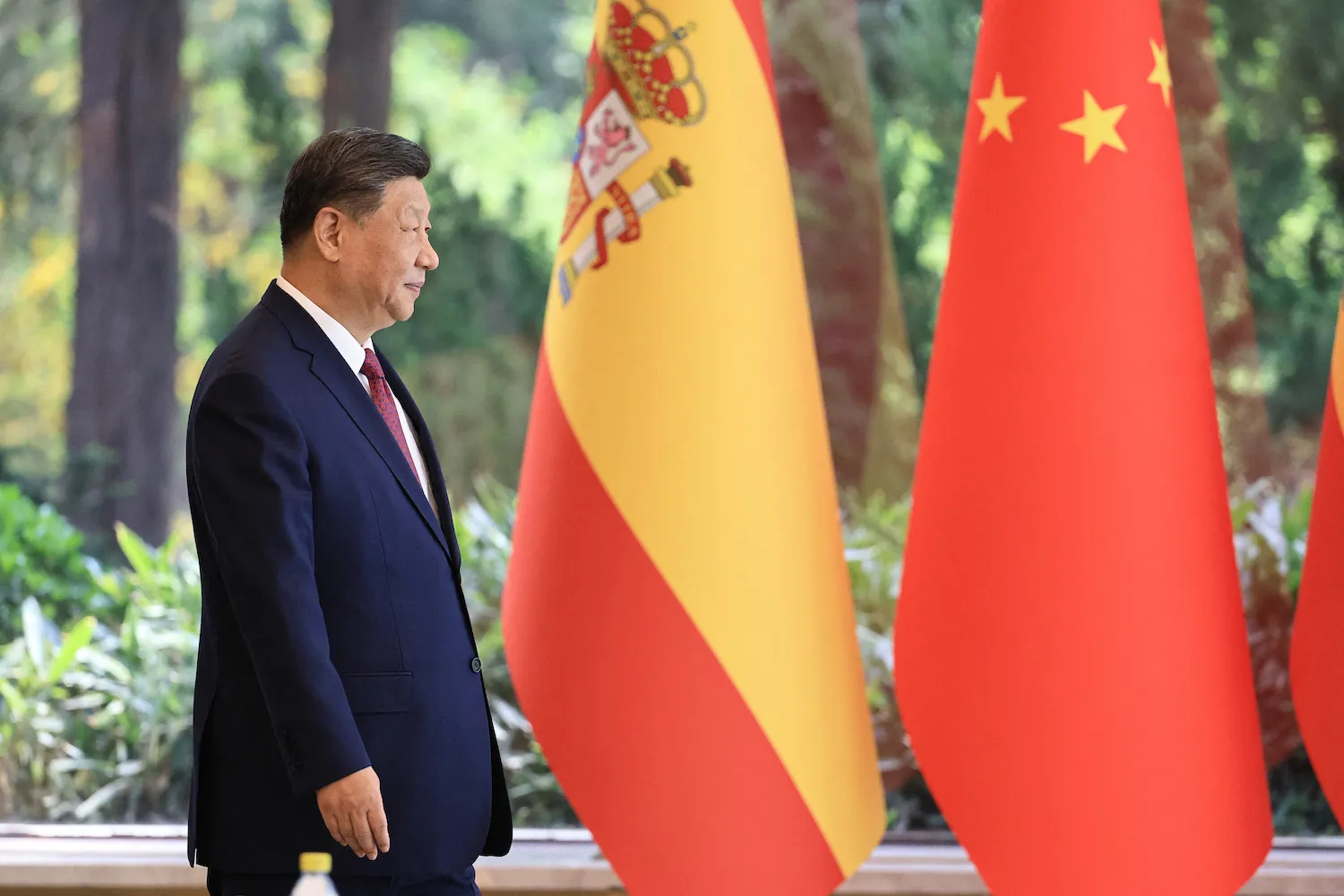
Federal judge orders USDA to unfreeze funds to Maine
April 12, 2025
Putting Tariffs on Your Nose to Spite Your Face
April 12, 2025Welcome back to World Brief, where we’re looking at China’s response to the U.S. trade war, new European efforts to aid Ukraine militarily, and Istanbul Mayor Ekrem Imamoglu’s first court appearance.
China Retaliates Further Against Trump’s Tariffs
China is not backing down. On Friday, Beijing announced plans to raise retaliatory tariffs on the United States from 84 percent to 125 percent, to go into effect on Saturday.
This marks the third massive countermeasure between the two superpowers in recent weeks, and it comes after U.S. President Donald Trump put a 90-day pause on new so-called reciprocal tariffs for all U.S. trading partners except China. (Other countries still face a universal 10 percent levy from the United States.)
The United States’ trade actions “will become a joke in the history of the world economy,” China’s Finance Ministry said in a statement on Friday. “However, if the U.S. insists on continuing to substantially infringe on China’s interests, China will resolutely counter and fight to the end.” China’s Commerce Ministry said it plans to file another lawsuit with the World Trade Organization against the Trump administration’s actions.
U.S. tariffs on China now total a minimum rate of 145 percent, including the increased 125 percent duty that Trump announced on Wednesday on top of the 20 percent levy that he issued near the start of his second term.
China’s tariffs on the United States, meanwhile, will affect key U.S. exports, such as soybeans, pharmaceuticals, and aircraft. Last week, China also suspended imports from some U.S. companies that sell sorghum, poultry, and bonemeal, and it placed more export controls on Chinese rare earths.
“There are no winners in a tariff war, and going against the world will only result in self-isolation,” Chinese President Xi Jinping said on Friday in his first public comments since the tit-for-tat escalation began.
Xi told Spanish Prime Minister Pedro Sánchez during their meeting in Beijing on Friday that China and the European Union must join together to defend globalization and oppose “unilateral acts of bullying,” in reference to U.S. tariffs.
Sánchez echoed Xi’s calls for unity while also pushing the United States and China to hold de-escalatory talks and calling for a more balanced trade relationship with the European Union.
But Europe is not the only place where China is hoping to weather the economic storm. Next week, Xi will embark on his first foreign trip this year, visiting Vietnam, Malaysia, and Cambodia. Xi’s Southeast Asia tour aims to bolster bilateral ties at a time when all three countries have sought trade talks with the United States.
On Friday, Reuters reported that Vietnam—Xi’s first stop—is preparing to crack down on Chinese goods that are shipped to the United States via its territory following comments from White House trade advisor Peter Navarro, who expressed concern that Chinese products are shipped to the United States bearing “Made in Vietnam” labels to avoid high tariffs.
Still, investors’ faith in the United States appears to be fracturing. On Friday, U.S. government bond yields rose by 0.1 percentage points, marking the latest upheaval for what has long been considered one of the most stable markets in the world. In the course of a week, the yield on the 10-year Treasury has moved from less than 4 percent to more than 4.5 percent.
Today’s Most Read
What We’re Following
A “critical year” for Kyiv. Ukraine’s European allies pledged $24 billion in military aid on Friday to fund the country’s war effort against Russia. More than half of the package will come from Germany, the EU’s largest economy, over the next four years. The United Kingdom and Norway will also provide $590 million.
This is a “critical year” for the war, British Defense Secretary John Healey said on Friday while co-hosting the Ukraine Defense Contact Group. Military chiefs from around 50 countries attended the high-profile talks in Brussels, though U.S. Defense Secretary Pete Hegseth was noticeably absent; he was expected to dial in virtually.
The meeting highlights renewed European efforts to take on a greater burden of NATO defense spending and aid for Ukraine at the White House’s urging. Yet European defense ministers warned on Friday that they see no end to the conflict.
“Given Russia’s ongoing aggression against Ukraine, we must concede peace in Ukraine appears to be out of reach in the immediate future,” German Defense Minister Boris Pistorius said.
Meanwhile, U.S. special envoy Steve Witkoff arrived in St. Petersburg on Friday for a meeting with Russian President Vladimir Putin to discuss “various aspects of the Ukrainian settlement,” Kremlin spokesperson Dmitry Peskov said. This is the third meeting between Witkoff and Putin as Trump pushes for a peace settlement while also seeking friendlier ties with the Kremlin.
Istanbul mayor in court. Detained Istanbul Mayor Ekrem Imamoglu appeared in a special court on Friday for the first time since he was arrested last month. Officials charged him with insulting and threatening Istanbul chief prosecutor Akin Gurlek following the arrest of a district mayor. However, these are not the charges that Imamoglu was originally arrested for.
Imamoglu could face a prison sentence of up to seven years and four months; his next scheduled hearing will take place on June 16. He maintains that the allegations against him are politically motivated.
“I am here because I won three elections in Istanbul—a city someone once called ‘my beloved Istanbul,’ a city about which they said, ‘who wins Istanbul wins Turkey,’ and a city they thought they owned,” Imamoglu said, referring to past remarks by Turkish President Recep Tayyip Erdogan and his ruling party. “I am here because I am the president in the hearts of 86 million people.”
Imamoglu was arrested last month on unrelated charges of corruption and aiding a terrorist group, sparking mass anti-government protests that led to nearly 2,000 arrests. Imamoglu denies all wrongdoing and has accused the government of targeting him because he is the chosen presidential candidate of the opposition Republican People’s Party.
U.S.-Iran talks. A lot is at stake ahead of Iran resuming nuclear negotiations with the United States in Oman on Saturday. Trump threatened this week to use military force to pressure Tehran into accepting a deal, saying, “If the talks aren’t successful with Iran, I think Iran is going to be in great danger.” He later suggested that Israel could be the “leader” of such military strikes.
Iran is taking a different approach, with Foreign Ministry spokesperson Esmaeil Baqaei saying on Friday that the country is “giving diplomacy a genuine chance in good faith and full vigilance.” Even the format of the talks has been disputed, with Trump calling it “direct” and Iranian officials maintaining that Oman will mediate.
Iran’s leaders say the country is not seeking to build nuclear weapons, and U.S. national intelligence director Tulsi Gabbard said in testimony before Congress last month that the U.S. intelligence community believes Tehran has not reauthorized its nuclear weapons program.
However, Trump maintains that such a threat is imminent, and the International Atomic Energy Agency has warned that Iran’s stockpile of enriched uranium is at roughly 60 percent purity, nearing the 90 percent weapons-grade level.
What in the World?
Former Brazilian President Jair Bolsonaro held a rally on Sunday in support of draft legislation that could do what?
A. Overturn a ban on him running for office
B. Free him and others from criminal charges related to an attempted coup
C. Impose retaliatory tariffs against the United States
D. Open the Amazon rainforest to further development
Odds and Ends
“Make America’s Showers Great Again” could be the latest slogan for Trump to latch onto. On Wednesday, the U.S. president signed an executive order rolling back a federal regulation that limits the amount of water that can come from a showerhead.
Former U.S. President Barack Obama initiated the policy to help conserve resources, but Trump relaxed those standards during his first term—only for former U.S. President Joe Biden to reinstate them. “I like to take a nice shower to take care of my beautiful hair,” Trump said on Wednesday during the signing ceremony.
And the Answer Is…
B. Free him and others from criminal charges related to an attempted coup
Bolsonaro repeatedly clashed with the judiciary during his time in office, but the courts ultimately held their ground, Andrew O’Donohue wrote last month.
To take the rest of FP’s weekly international news quiz, click here, or sign up to be alerted when a new one is published.
#China #Retaliates #Percent #Tariff #U.S #Goods
Thanks to the Team @ World Brief – Foreign Policy Source link & Great Job Alexandra Sharp





